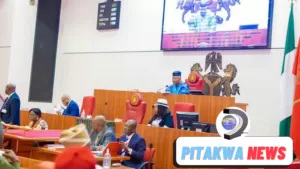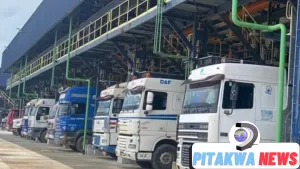Dangote Refinery Reduces Petrol Price for Marketers to N970 per Litre

In a move that is expected to have a positive impact on the Nigerian fuel market, Dangote Refinery has reduced the ex-depot price of premium motor spirit (PMS), also known as petrol, to N970 per litre for oil marketers.
The price reduction, which is effective immediately, is a significant development in the Nigerian fuel market, which has been experiencing fluctuations in recent times. The reduction in petrol price is expected to lead to a decrease in the pump price of petrol, which will be a welcome relief to motorists and other fuel consumers.
_Dangote Refinery Signs Agreement with IPMAN_
In addition to the price reduction, Dangote Refinery has also signed a significant agreement with the Independent Petroleum Marketers Association of Nigeria (IPMAN) to supply 60 million litres of petrol each week. This arrangement is expected to boost the association’s distribution capacity and enhance fuel supply across Nigeria.
The agreement, which was signed at the Dangote Refinery headquarters in Lagos, is a major milestone in the company’s efforts to enhance fuel distribution across Nigeria. The agreement is also expected to reduce the country’s dependence on imported fuel and promote the use of locally refined fuel.
_Boost to Fuel Distribution_
The reduction in petrol price and the agreement with IPMAN are part of Dangote Refinery’s broader strategy to enhance fuel distribution across Nigeria. The company has invested heavily in its logistics and distribution infrastructure, including the construction of a 400,000-tonne per annum petroleum products terminal.
The terminal, which is located in the Lekki Free Trade Zone, is designed to receive and store petroleum products, including petrol, diesel, and aviation fuel. The terminal will also serve as a hub for the distribution of petroleum products to other parts of the country.
_Positive Impact on the Economy_
The reduction in petrol price and the agreement with IPMAN are expected to have a positive impact on the Nigerian economy. The reduction in petrol price will lead to a decrease in the cost of transportation, which will have a ripple effect on the prices of goods and services.
The agreement with IPMAN will also boost the association’s distribution capacity, which will lead to an increase in the supply of petroleum products across the country. This will have a positive impact on the economy, as it will reduce the reliance on imported fuel and promote the use of locally refined fuel.
_Conclusion_
The reduction in petrol price and the agreement with IPMAN are significant developments in the Nigerian fuel market. The reduction in petrol price will lead to a decrease in the cost of transportation, while the agreement with IPMAN will boost the association’s distribution capacity and enhance fuel supply across Nigeria.







